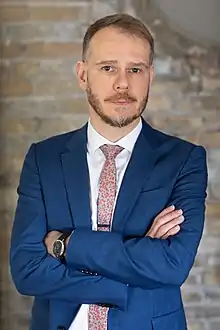Dietram Scheufele
Dietram A. Scheufele is a German-American social scientist and the Taylor-Bascom Chair in the Department of Life Sciences Communication at the University of Wisconsin–Madison. He is also a Distinguished Research Fellow[2] at the University of Pennsylvania's Annenberg Public Policy Center. Prior to joining UW, Scheufele was a tenured faculty member in the Department of Communication at Cornell University.
Dietram A. Scheufele | |
|---|---|
 Scheufele in 2019 | |
| Nationality | Germany, USA |
| Occupation | Social scientist |
| Title | Taylor-Bascom Chair | Vilas Distinguished Achievement Professor |
| Academic background | |
| Alma mater |
|
| Academic work | |
| Discipline | Communication science, Ph.D. minor in political science |
| Sub-discipline | Science communication and political communication |
| Institutions | Cornell University | University of Wisconsin–Madison | Morgridge Institute for Research |
| Notable works | Oxford Handbook of the Science of Science Communication (Oxford University Press, 2017)[1] |
| Website | http://www.dietramscheufele.com/ |
Research
Scheufele is the author or co-author of over 200 articles and monographs, and one of the most widely-cited experts in the fields of political communication,[3] science communication,[4] and science & technology policy.[5] His publications include work on framing theory,[6][7][8] participatory democracy,[9][10] and the science of science communication.[11][12][13] He is an elected member of the German National Academy of Science and Engineering, and a lifetime associate of the U.S. National Research Council.[14] Scheufele is also an elected fellow of the American Association for the Advancement of Science, the International Communication Association, and the Wisconsin Academy of Sciences, Arts & Letters.[15]
Awards
Scheufele's research has been recognized with awards from professional and scholarly organizations, including the American Association for the Advancement of Science, the Association for Education in Journalism and Mass Communication, the International Communication Association, the National Academies of Sciences, Engineering, and Medicine, and the World Association for Public Opinion Research.
He has won teaching awards from both universities with which he has been affiliated, including the Cornell University College of Agriculture and Life Sciences Young Faculty Teaching Award[16] and the University of Wisconsin–Madison College of Agricultural and Life Sciences Spitzer Excellence in Teaching Award,[17] as well as the Association for Education in Journalism and Mass Communication's Krieghbaum Under-40 and MC&S Promising Professor awards.[18]
References
- "Oxford Handbook of the Science of Science Communication".
- "Distinguished Research Fellows". The Annenberg Public Policy Center of the University of Pennsylvania. Retrieved 29 November 2020.
- "Google Scholar". Retrieved 28 April 2020.
- "Google Scholar". Retrieved 28 April 2020.
- "Google Scholar". Retrieved 28 April 2020.
- Framing as a theory of media effects
- Framing, agenda-setting, and priming
- The end of framing as we know it
- Community, communication, and participation
- Social structure and citizenship
- Science communication as political communication
- Communicating science in social settings
- Science audiences, misinformation, and fake news
- "Department of Life Sciences Communication". Retrieved 28 April 2020.
- "Dietram Scheufele". www.wisconsinacademy.org. 12 September 2012. Retrieved 29 November 2020.
- "Young Faculty Teaching Award". CALS. Retrieved 29 November 2020.
- "UW-Madison CALS Spitzer Excellence in Teaching Award".
- "AEJMC Award Recipients". AEJMC. 24 June 2014. Retrieved 29 November 2020.